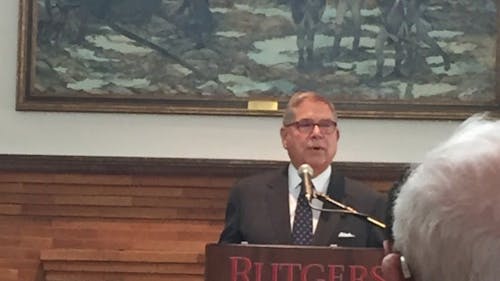CEO of Knight Foundation speaks about influence of technology on journalism, citizen trust

Yesterday evening, Alberto Ibargüen, the president and CEO of the Knight Foundation as well as former publisher of The Miami Herald, came to Rutgers to speak about journalism, its influence on the public and the power of giant tech companies.
The event was part of the annual Richard D. Heffner Open Mind Lecture. In an introductory remark, Mark Angelson, the vice chair of the Board of Governors, spoke about his personal experiences with Heffner as a mentor and friend.
Angelson also introduced Heffner’s grandson, Alexander Heffner, who is the current host of “The Open Mind” on PBS.
“Alexander now reaches millions of people every year,” he said. “I’m honored today to remind you all about (Richard D. Heffner) and to introduce his grandson.”
Giving further reflections, Alexander Heffner took the podium and described his grandfather’s legacy, as well as how he first got to know Ibargüen. He said his grandfather not only designed a program to entertain, but also to teach. Before Alexander Heffner took on the role of hosting “The Open Mind,” though, Ibargüen took an interest in him as a student journalist.
“He took a chance on me long ago to be part of this grand experiment,” Alexander Heffner said. “I’m grateful for him for his imagination and leadership now stewarding a foundation that is central to the preservation of American democracy.”
Ibargüen started his lecture by first recounting his New Jersey roots since he grew up in South Orange before delving into the current state of journalism.
“I’m here this evening … to talk about a world turned upside down,” he began.
His foundation’s mission was to support and inform the community, because an informed citizen might determine their true interest. Ibargüen said the First Amendment was also a “living organism,” because attitudes toward its protection have changed during the most recent decades.
These attitudes contradict each other, with certain populist leaders calling for control of free speech, college students calling for safe spaces and Internet platforms choosing to use information in a way that makes misinformation more likely, he said.
This is due to both a structural shift in the media and a societal shift. For most of the country’s history, news has been decentralized, which means that people read newspapers that are more focused on local and regional happenings.
Newspapers in the past also had a more limited reach, often reporting within a district, which meant that there was more attention on candidates that a town would be electing. There was less of a focus on national officials, who were often far away in Washington, D.C. or major cities, Ibargüen said.
This meant there was less of a “distance” between the newspaper and the reader, which led to increased trust in the media.
“Technology upended that structure,” Ibargüen said. “It decimated the business of local and regional news, replacing it with a faster and much more efficient system of delivery. As a result, we’re homogenized news into national shouting matches.”
He argued that local news was the “bedrock” of society, which was why the Knight Foundation recently announced a $300 million investment into local news. The current lack of trust in the media, as well as each other, was a serious issue that increased local reporting could help resolve, he said.
With the rise of technology, Ibargüen said he is optimistic and believes that it will be integral to solving this issue, despite being the reason for media’s downfall. Tech giants have already begun this endeavor, with Facebook focusing on dealing with harmful content and privacy, and Google making investments into finding viable business models for news.
For the most part though, technology has been detrimental to the media. Ibargüen said its efficiency has damaged the traditional advertising model of newspapers, since it offers information at the cost of information, not money. Given technology’s novelty, it also means that regulations have not caught up to their advancing developments.
“Why is technology still governed by rules and regulations written for print and broadcast? In a world of digital media, we’re still thinking in 18th and 19th-century industrial models,” he said.
Ibargüen then discussed the history of antitrust laws, describing how some have proposed a “duty of care” from tech companies, which could mean placing legal requirements on their products or services. Others proposed that these companies should have a legal obligation to treat consumers’ information in certain regulated ways, similar to how a bank treats a person’s deposits.
As for his personal view, Ibargüen said considering how publishers were responsible for the content they present to the public, tech companies should also be governed to “reduce harm.”
In the final minutes of his lecture, Ibargüen covered free speech and the First Amendment, especially in relation to college students and the internet. College students support the First Amendment and safe spaces, which he concluded meant that students valued inclusiveness and stopping hate speech.
While the laws in the First Amendment were established for print and broadcasting, there was still ambiguity when it came to how it applied to online platforms, he said.
“These are not issues for you to keep in the back of your mind. These are issues that require citizens’ immediate attention,” Ibargüen said.



